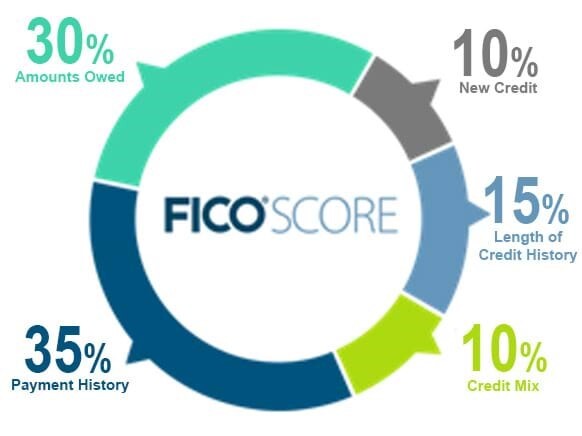The most ideal time to look into your financial situation when divorcing is before you start the legal divorce process. It is most important to understand your financial situation prior to negotiating. However, if you have already started mediation or you are working with a family lawyer, go ahead and review this comprehensive credit score checklist to ensure you have covered all your bases.
This article is ideal for anyone who wishes to learn the impact of their credit during the divorce process.
What Is a Credit Score? A Divorcee’s Guide to Credit Basics
Should you be analyzing your credit score on your own or should you get help? Access our top list of do’s and dont’s:
- A credit score is a three-digit number that represents your creditworthiness, calculated using information in your credit reports.
- Credit scores range from 300 to 850, with higher scores indicating lower risk to lenders.
- FICO Scores are the standard for credit scores, used by 90% of top lenders to evaluate credit risk.
- Credit scores influence the credit available to you and the terms offered by lenders, such as interest rates.
During an amicable divorce, especially when financial responsibilities are divided, maintaining a strong credit profile can ease transitions like refinancing a home or securing a new rental.
How Your Credit History Impacts Divorce and Rebuilding Credit
Your credit report contains information about your credit history, including account numbers, debt levels, repayment history, and other factors. After divorce a reviewing your credit report can help ensure shared accounts are closed or transferred appropriately..
- The three major credit reporting agencies (Equifax, Experian, and TransUnion) create credit reports that include a history of your credit, loans, and other financial information.
- Credit reports are used to calculate your credit score, which is a three-digit number that ranges from 300 to 850.
- A good credit score is typically 700 or higher.
Top 5 Factors That Affect Your Credit Score After Divorce
How many inquiries have you done on your credit? Will it hurt you or help you? Post-divorce financial planning should include efforts to lower your credit utilization ratio to avoid damaging your score when separating joint accounts or opening new ones.
- Payment history is a significant factor in determining your credit score, with late payments negatively affecting your score.
- Credit utilization, or the amount of credit used compared to the credit limit, also affects your credit score.
- Length of credit history, credit mix, and new account openings are also considered when calculating your credit score.
- Credit scoring models, such as FICO and VantageScore, use different factors to determine your credit score.
How to Improve Your Credit Score During a Divorce
- Paying bills on time and keeping credit utilization low can help improve your credit score.
- Correcting errors on your credit report can also help improve your credit score.
- Avoiding new accounts and keeping existing credit accounts in good standing can also positively affect your credit score.
- Monitoring your credit report and score regularly can help you identify areas for improvement.
Monitoring Your Credit Score: Why It Matters Post Divorce
- Your credit score can change over time as new information is added to your credit report.
- Credit scores from a month ago are probably not the same score a lender would get from the credit bureau today.
- Monitoring your credit score regularly can help you track changes and identify areas for improvement.
- You can get a free credit report once a week from each of the three major credit bureaus.
Why Your Credit Score Matters More in a Divorce
A good credit score can make it easier to get a loan, rent an apartment, or lower your insurance rate.
- Credit scores play a significant role in determining the interest rates and terms offered by lenders.
- A high credit score can save you money on interest rates and loan terms.
- Credit scores are used by insurance companies to determine insurance premiums and by cellphone companies to determine phone plans.
This becomes important when negotiating post-divorce financial arrangements like mortgages or auto loans, which are often renegotiated during an amicable divorce.
How Divorce Affects Your Credit Score and What to Do About It
Divorce can affect your credit score, especially if you have joint accounts or shared credit responsibilities. In an amicable divorce, creating a clear credit separation plan can prevent long-term financial damage and support a clean financial slate.
- Closing joint accounts or removing your name from shared credit accounts can negatively affect your credit score.
- Rebuilding credit after divorce requires careful financial planning and budgeting.
- Credit counseling and education can help you navigate the process of rebuilding credit after divorce.
- What do you with authorized users on your account?
Consider removing your ex-spouse as an authorized user to protect your credit score from unintended spending, especially if you’re rebuilding credit after divorce.
Financial Recovery Tips After Divorce: Credit, Budgeting & More
- Create a budget and track your expenses to get a clear picture of your financial situation.
- Prioritize debt repayment and focus on paying off high-interest debt first.
- Consider credit counseling or financial planning services to help you navigate the process of rebuilding credit.
- Avoid new credit accounts and focus on rebuilding existing credit accounts.
Step-by- Step Rebuilding Credit After Divorce
- Rebuilding credit after divorce requires time and effort, but it is possible with careful financial planning and budgeting.
- Focus on paying bills on time and keeping credit utilization low to improve your credit score.
- Consider opening a new credit account or becoming an authorized user on someone else’s credit account to start rebuilding credit.
- Monitor your credit report and score regularly to track progress.
Several divorce support platforms offer credit monitoring tools specifically designed for people navigating the financial recovery process after divorce.
Credit Score Recovery After Divorce: What Works and What Doesn’t
- Credit score recovery after divorce requires patience and persistence.
- Focus on rebuilding credit by paying bills on time and keeping credit utilization low.
- Avoid new credit accounts and focus on rebuilding existing credit accounts.
- Consider credit counseling or financial planning services to help you navigate the process of rebuilding credit.
Get Help: Credit Counseling & Education for Divorcing Couples
- Credit counseling and education can help you navigate the process of rebuilding credit after divorce.
- Consider working with a credit counselor or financial planner to create a personalized plan for rebuilding credit.
- Learn about credit scoring models and how to improve your credit score.
- Understand the importance of credit reports and how to monitor them regularly.





